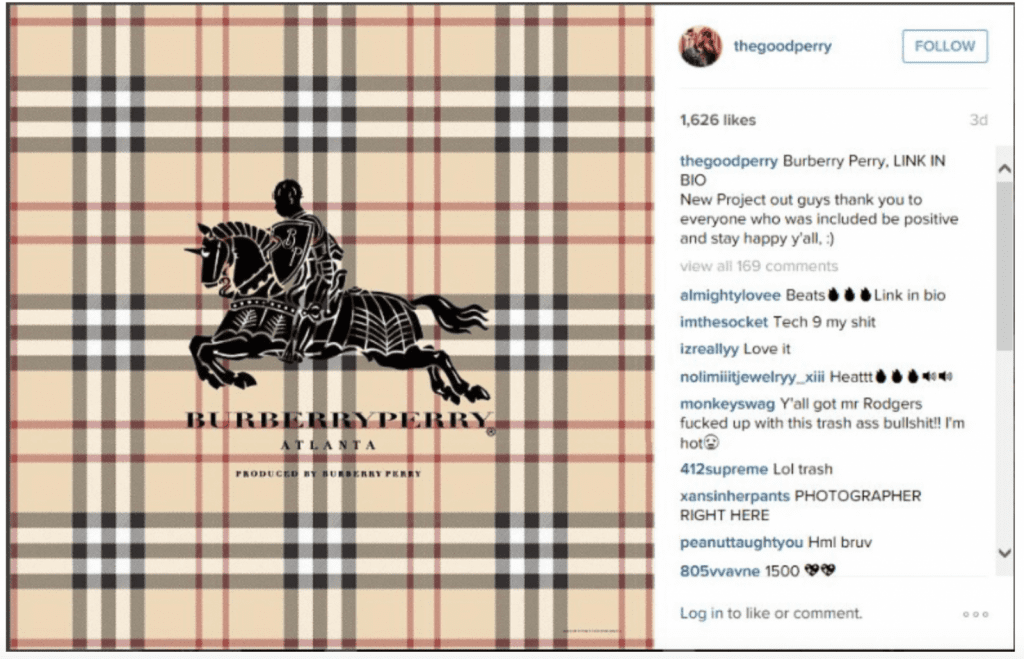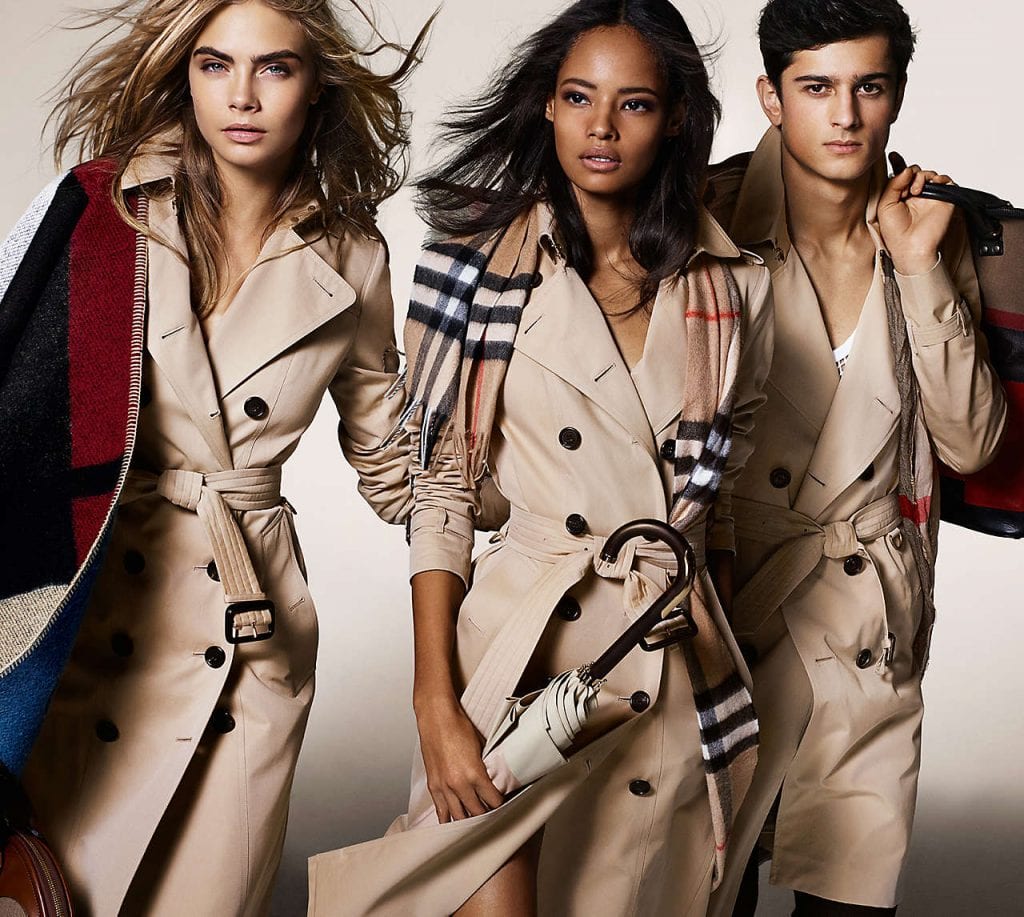Burberry has filed suit against an Atlanta-based rapper/producer in New York federal court, alleging that he is infringing its trademarks by calling himself Burberry Perry and using its federally registered check pattern and equestrian trademark in connection with his album and social media pages. According to Burberry’s 48-page complaint, which was filed on Monday in the U.S. District Court for the Southern District of New York, Perry Moise – aka Burberry Perry – is engaged in the “willful trademark infringement and dilution of the famous BURBERRY trademarks” and despite extensive efforts by Burberry to prevent Moise from continuing to engage in such allegedly infringing behavior, the musician simply will not cooperate.
According to Burberry’s complaint, Perry Moise has engaged in “obvious copying of the Burberry trademarks” with the “intent to benefit from the brand that admittedly inspired the ‘Burberry Perry’ name and [his] Burberry-dependent persona.” The London-based brand claims that “inspired by Burberry and its trademarks, which have been used exclusively and continuously by Burberry and its authorized licensees for 160 years,” Moise adopted “Burberry Perry” as his stage name, albeit “without the authorization of Burberry, and is using the fame and renown of the Burberry trademark for his own personal gain, to promote his albums, garner media attention, and grow a fan base, all to the detriment of Burberry.”
Burberry alleges that Moise’s use of the “Burberry Perry” moniker “is intentionally and directly inspired by Burberry, which [he] freely admitted during a live Periscope1 broadcast on July 9, 2016,” and infringes “upwards of 20 of its federally registered trademarks,” from its famous word mark and checkered logo to its “Burberry equestrian knight on horseback” logo, which are registered in an array of classes of goods and services, including for use on garments and accessories, and retail stores services, among others.
As for whether consumers are actually likely to be confused by Moise’s use of the Burberry name, a significant consideration since likelihood of confusion is the central inquiry in a trademark infringement claim, the one 150-plus year old fashion brand claims that given its involvement in a number of music-related ventures, including its usage of musicians, such as John Epstein, Tom Atkin, Edward Larrikin, Kieran Webster, George Craig, Roo Panes, Sir Elton John, James Bay, George Ezra, in ad campaigns, Moise’s usage of the Burberry trademarks is particularly damaging, and in fact, likely to mislead the consuming public.

Burberry notes that it has partnered with Apple Music by way of “Burberry’s channel [which] showcases Burberry’s unique collaborations with emerging and iconic artists, featuring performances, songs, and films alongside regular playlists celebrating great musical talent past and present. Moreover, Burberry cites its launch of BURBERRY ACOUSTIC, “a platform that provides music and exclusive videos from emerging artists who are carefully selected by Burberry” and its “continuous use of the Burberry trademarks in connection with the sale, distribution, and advertising of music since that time.”
Still yet, the brand goes on to allege that Moise’s music sheds a poor light on its company, which is known for being “a global luxury brand with a distinct heritage and reputation of design, innovation, and craftsmanship.” In particular, Burberry points to Moise’s “release of ‘Beautiful Day’ on the ‘Burberry Perry’ album, [which] caused a social media firestorm about whether Kylie Jenner rapped [his] lyrics, ‘I wish a f*ck n*gga would, yeah.’” Moreover, Burberry argues that the media and the public-at-large have “criticized the album” on the basis of the “extensive use of profanity and autotune.”
In light of its “extensive efforts to stop [Moise’s] infringing conduct,” Burberry claims that “it became clear that [he] had no intention to cease his unauthorized use of the Burberry trademarks.” As such, Burberry argues that it “had no choice but to seek the relief requested herein.” As a result, Burberry is asking the court to order the Moise to cease all use of its various trademarks – including its name and check logo.
Why do design houses like Burberry care when others use their trademarks? Well, the answer is relatively simple. Because their trademark rights – which are some of their most valuable assets – and the goodwill associated with those marks depend on it. The use of such marks – whether it be in the form of Louis Vuitton’s Toile Monogram or Burberry’s trademarked name – by unauthorized third parties risks resulting in either consumer confusion and/or dilution of the uniqueness/distinctiveness of the mark (or both), which stands to chip away at the rights a trademark holder has, as well as diminish the specific image that the brand has built and seeks to maintain.
So, when big brands are engaging in actions that may seem like unnecessarily bullying against smaller similarly-named businesses, it is almost always for the purpose of maintaining their own names – for better or worse.
UPDATE (AUGUST 1, 2016): Moise announced via Twitter that he has agreed to change his name, as well as the title of one of his songs. Perry has now changed his name to The Good Perry, and released a new track, entitled, Blueberry.
Following a preliminary injunction grant on August 15, 2016, the suit ultimately came to a close in November 2016 after Moise failed to respond to the complaint. As a result, the court entered a final default judgment and permanent injunction in Burberry’s favor, thereby, permanently preventing Moise from “using the Burberry trademarks and any variation thereof as a trademark, service mark, trade name component, title, Internet domain name, or otherwise, to market, advertise, distribute, sell, produce, promote, offer for sale, sell, or identify any business, products, or services.”
As for whether the preliminary injunction decision, which skewed in favor of Burberry, means that any performer who picks a stage name that happens to be the same as or similar to a well-known trademark is out of luck? That is not necessarily the case. According to Dorsey & Whitney LLP’s Bruce R. Ewing, “Those of us of a certain age will recall the 1991 film ‘New Jack City’ and its song ‘Lyrics 2 the Rhythm,’ which was recorded by the singer Tamara Hutchinson, who used the stage name ‘Essence,’ and was produced by Joseph Saddler, better known as Grand Master Flash.”
“Unfortunately for Saddler and Ms. Hutchinson, her stage name drew the wrath of Essence Communications, publisher of the well-known Essence magazine,” Ewing notes. “Essence Communications sued Saddler and Ms. Hutchinson seeking to stop her from using ‘Essence’ as a stage name, but that effort was rejected by the same New York court that ruled in favor of Burberry a few weeks ago. Why? Primarily because the court found that ‘essence’ was a word used as all or part of a trademark by many others, and that Ms. Hutchinson had made no effort to associate herself with the magazine of the same name.”
“So, Hutchinson won her case because the facts concerning her adoption and use of ‘Essence’ were more favorable to her than the brand owner,” per Ewing. “Unfortunately for Ms. Hutchinson, though, notwithstanding that she won this battle, no other songs by ‘Essence’ recorded after 1991 turn up in online searches, so it would appear that Essence Communications wound up winning the war. Perhaps The Good Perry will find that his new name is a harbinger of greater success in the music business.”
* The case is BURBERRY LIMITED (UK) ET AL V. MOISE, 1:16-cv-05943 (SDNY).











